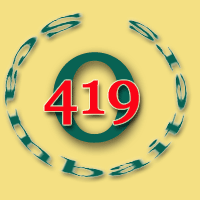
• Home •
Victim΄s Story •
Fraud Prevention •
Project GSO •
Hall of Shame •
LINKS •

All About Financial Crimes
What are Financial Crimes?
Financial crimes including check fraud and deposit are among the largest challenges facing businesses and financial institutions today. Financial crime professionals have become increasingly skilled and sophisticated, thanks to advances in readily available technology such as personal computers, scanners and color photocopiers. It has been estimated that the annual losses due to check and deposit fraud are in the billions of dollars. Losses continue to grow steadily as criminals continue to seek ways to earn a living by defrauding others. For the consumer, the amount of inconvenience and anxiety caused by resolving problems with the account, local merchants, as well as possible repercussions with credit bureaus can be considerable. These crimes also affect consumers by means of increased fees they have to pay banks due to the banks having to hire risk identification specialists and to purchase specialized software to protect them from further losses.
A lot of counterfeiting is done through desktop publishing and copying to create or duplicate an actual financial document, as well as chemical alteration, which consists of removing some or all of the information and manipulating it to the benefit of the criminal. Victims include financial institutions, businesses that accept and issue checks, and the consumer. In most cases, these crimes are perpetrated by means of someone stealing a blank check from your home or vehicle during a burglary, searching for a canceled or old checks in the garbage, removing a check you have mailed to pay a bill from the mailbox, stealing bank statements and expired ATM cards from your home or garbage, as well as other low-tech and high tech methods of acquiring your banking account information.
What are Some Common Types of Financial Crimes?
The following are financial crimes typically committed against banks and financial institutions:
Kiting - This type of check fraud uses a combination of the time between a check deposit and its presentment to the paying bank AND the willingness of the receiving bank to advance funds against the uncollected balance. In many kiting schemes several accounts at different banks are carefully manipulated to make it appear that the behavior of the account is predictable and low risk thereby enticing the bank into advancing withdrawals against uncollected fund. Since many honest business accounts operate on tight, or overdrawn account balances, it is often difficult to detect the true kiting scheme. Left to run undetected, kiting can result in major losses to the bank.
Forgery - For a business, forgery typically takes place when an employee issues a check without proper authorization. Criminals will also steal a check, endorse it and present for payment at a retail location or at the bank teller window, probably using bogus personal identification.
Counterfeiting - Counterfeiting can either mean wholly fabricating a check using readily available desktop publishing equipment consisting of a personal computer, scanner, sophisticated software and high-grade laser printer or simply duplicating a check with advanced color photocopiers.
Alteration - Alteration primarily refers to using chemicals and solvents such as acetone, brake fluid and bleach to remove or modify handwriting and information on the check. When performed on specific locations on the check such as the payee's name or amount, it is called spot alteration; When an attempt to erase information from the entire check is made, it is called "check washing."
Stolen Checks - One way to attack another person's checking account is to steal, or otherwise misappropriate checks for the account. This can occur by locating checks in the mail, or by infiltrating a home or business where the checks are stored. Sometimes a few stolen checks are used as the basis for counterfeiting. Without appropriate detection methods stolen checks often go undiscovered until the account holder detects the activity in an end-of-month statement.
Paperhanging - This problem primarily has to do with people purposely writing checks on closed accounts (their own or others), as well as reordering checks on closed accounts (their own or others).
Money Laundering - Money that is made through illegal activities needs to be entered into the banking system so it can be moved from place efficiently and stored securely. Currency (cash, money orders, traveler's checks, etc.) can only be deposited in increments below $10,000 to avoid being reported. A endless array of schemes has developed for the purpose of "Structuring" and "Laundering" currency in the process of converting it from "dirty" to "clean" funds. The major risk to a bank is in the potential for complicity and violation of Bank Secrecy Act requirements.
New Account Fraud - Checking accounts are easy to open because most banks are eager for new customers. The ease with which identity documents can be falsified, the limits posed by Privacy Act provisions, and the cost of running background or credit checks contribute to the ease with which New Account Fraud can be conducted. Once an account is opened and a low risk profile of activity is established, the fraud criminal may use the account to perform a wide variety of different fraud schemes.
Embezzlement - Anyone with ready access to financial accounts has the potential of conducting embezzlement. Accounts within the bank, or the accounts of the bank's customers may be attacked. The methods used for embezzlement are very diverse and may include maker and endorser forgery, stolen checks, counterfeiting, misuse of debit/credit/ATM cards, wire transfers, new account opening, and many other schemes. Embezzlement can continue to occur over long periods of time.
Transit Fraud - The delay encountered by U.S. banks in receiving check deposits, transferring them to the paying bank for payment and receiving the funds provides the opportunity around which many types of fraud are conducted. Most banks are willing to release funds to apparently good customers before they have been collected from the paying bank. Thus, withdrawals can occur before the bank discovers that a check will not be covered by the paying bank.
How Can I Avoid Being Financial Crime Victim?
Banks are taking increasingly sophisticated approaches in detecting and stopping fraudulent activity. To keep from being a victim, you too have to take a proactive role in safeguarding your checks, ATM cards and other bank account information. The following common-sense tips will help minimize your chance of becoming a victim:
Make sure your checks are endorsed by your financial institution and incorporate security features that help combat counterfeiting and alteration.
Store your checks, deposit slips, bank statements and canceled checks in a secure and locked location. Never leave your checkbook in your vehicle or in the open.
Reconcile your bank statement within 30 days of receipt in order to detect any irregularities. Otherwise, you may become liable for any losses due to check fraud.
Never give your account number to people you do not know, especially over the telephone. Be particularly aware of unsolicited phone sales. Fraud artists can use your account without your authorization and you may end up being responsible.
Unless needed for tax purpose, destroy old canceled checks, account statements, deposit tickets, ATM receipts (they also frequently have your account number and worse yet, your account balance). The personal information on it may help someone impersonate you and take money from your account.
When you receive your check order, make sure all of the checks are there, and that none are missing. Report missing checks to your bank at once. Should you fail to receive your order by mail, alert your bank. Checks could have been stolen from mail box or lost in transient.
If your home is burglarized, check your supply of checks to determine if any have been stolen. Look closely, because thieves will sometimes take only one or two checks from the middle or back of the book. The longer it takes to detect any of your checks have been taken, the more time the criminal has to use them successfully.
If someone pays you with a cashier's check, have them accompany you to the bank to cash it. If at all possible, only accept a check during normal business hours so you can verify whether it is legitimate. Make sure you obtain identification information from the individual
Do not mail bills from your mailbox at night. It is a favorite location from which a criminal can gain possession of your check with the intent to defraud you. Criminals will remove a check from your mailbox and either endorse it using bogus identification, photocopy and cash it repeatedly, scan and alter the check, or chemically alter it. The Post Office is the best location from which to send your bill payment.
Limit the amount of personal information on your check. For example, do not include your Social Security, driver's license or telephone numbers on your check. A criminal can use this information to literally steal your identity by applying for a credit card or loan in your name, or even open a new checking account.
Don't leave blank spaces on the payee and amount lines.
Use dark ink that can't be easily erased or covered over.
Don't write your credit card number on the check.
Use your own pre-printed deposit slips, and make sure the account number on your slip is correct. Thieves occasionally alter deposit slips in the hope you won't notice and the money goes into their account.
Don't make a check payable to cash. If lost or stolen, the check can be cashed by anyone.
Never endorse a check until you are ready to cash or deposit it. The information can be altered if it is lost or stolen.
Be sure no one is looking over your shoulder while you're entering your ATM PIN number to conduct an ATM or point of sale transaction.
Cut up expired ATM cards into small pieces before throwing them away.
Choose a PIN number that is easy for you to remember, but does not contain other identifying information about you, such as your birth date or any part of your Social Security number.
Never carry your PIN number with you. Remember it immediately. If you need to have it as a reference, lock it up with your other bank correspondence.
Review your bank statements regularly. If you notice any suspect transactions, notify your bank immediately.
How Do I Report a Financial Crime?
Help stop financial crimes by reporting them to the National Check Fraud Center.
The National Crime Alert Network is a network of local law enforcement, Federal Bureau of Investigation (FBI), US Secret Service, and financial and retail communities that participates in a rapid response notification network, providing "real time" information and intelligence of criminal activity and crimes within a given area.
Report stolen checks, credit card fraud, debit card fraud, NSF checks, closed account checks, stopped payments, checks involved in a scam, forged and counterfeit checks that you or your organization have received.
Call: (843) 571-2143
Hours 8am to 8pm Eastern Time Zone
Fax: (843) 571-4349
Write:
National Check Fraud Center
Post Office Box 80171
Charleston, S. C. 29416
E-Mail cbruce@ckfraud.org
Online Form http://www.ckfraud.org/repform.html
What is the difference between criminal law and civil law?
Civil law suits are private suits between two or more citizens. Civil law is the area of law by which private individuals resolve their differences with the help of the civil courts. Criminal law involves a citizen or a business and the state. The rules of the federal government and all individual state governments are codified into statutes. When an individual violates the rules, as listed in the statutes, then the federal government or the state will prosecute the individual. The remedies available in civil courts are generally limited to money damages. The remedies in criminal court may involve a money fine and/or a prison sentence.
© by GSO • Contact